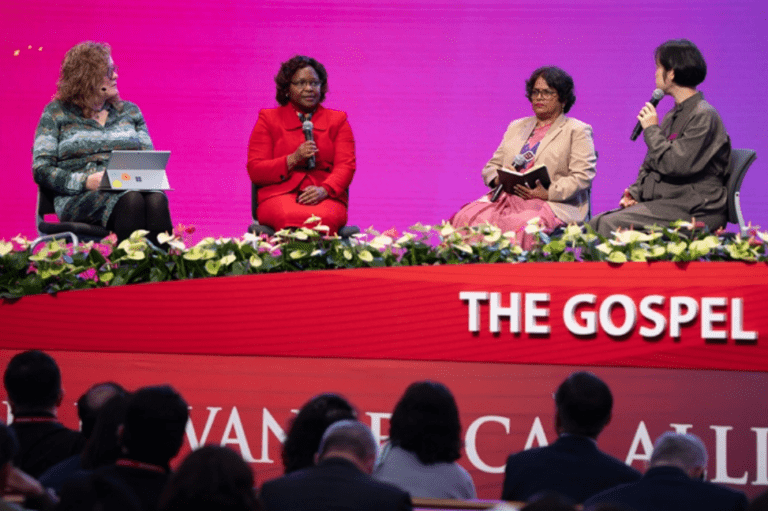SEOUL, South Korea — Women and girls are easy targets for religious persecution, but their plight is often exacerbated when they are excluded from their church communities after escaping captivity, gender-based persecution experts say.
The vulnerabilities faced by Christian women who are part of religious minorities in South Asian and African countries were the focus of a panel discussion moderated by Emma van der Dijl, CEO of Gender and Religious Freedom, at the 14th General Assembly of the World Evangelical Alliance held last Tuesday at Saran Church.
Irene Kibagendi, Executive Director of the Pan-African Christian Women’s Union, highlighted the abuses women are subjected to in Nigeria, Sudan and the Democratic Republic of Congo. Sharing stories of young women that have become all too common, she exposed the reality that “they are easy targets.”
Kibagendi explained that girls are often abducted while attending school and then forced to convert to Islam – a pervasive problem that has been reported numerous times by The Christian Post for more than a decade.
After being kidnapped and raped, often by multiple men, young women lose their self-esteem and identity. And even when they manage to escape their captors and seek reunion and healing in the communities from which they were forcibly removed, they often face rejection.
“Despite being persecuted for being a Christian, when I return to church I am not accepted,” Kibagdendi lamented, noting that by the time they return, they are often pregnant or have already given birth to children whose fathers are militants linked to terrorist organizations such as Boko Haram and al-Shabaab.
“They are rejected by their families. Their husbands can’t accept them. The church can’t accept them,” she added, pointing to the need for a system that allows women to reunite and recover, rather than dismissing them as social outcasts.
“It is as if the targeted women and girls are now enemies of the church, or as if the church believes that the blood of Christ is not powerful enough to cleanse these women and keep the church pure,” van der Dijl said.
“The enemy wins when we deliberately allow the shame of persecution to cause division and rejection within the church,” van der Dijl added, frequently pointing to Satan’s plans to cause division among believers. “Instead, it is our responsibility to restore those who have experienced persecution with love and acceptance, knowing that their weaknesses and identities are safe in Christ. And this applies not only to women, but also to the men and children of our church.”
In a previous interview with The Christian Post about gender-based persecution, Sarah Cunningham, chief operating officer of Open Doors US, spoke about the long-term psychological effects of persecution, including PTSD, anxiety, and social withdrawal among victims.
Women who have been raped “carry stigma and shame because of this kind of hidden, secret, very intimate violation,” she says. “And often the long-term effects are on their psyche.”
Cunningham added that some women fear that “something equally violent could happen to them at any time,” making them feel “powerless” and causing them to withdraw from society.
Despite the discouraging situation, Van der Dijl noted that some churches are “stepping outside of cultural norms” to walk with women in need of recovery and reintegration into their families and society. Therefore, it places the blame on the perpetrator rather than the victim.
Reverend Martha Das, secretary general of the Bangladesh National Christian Union, also addressed cultural issues within churches operating in Christian minority countries, where followers of Jesus often face ridicule, discrimination and violence.
While some faith-based organizations are helping vulnerable Christians facing persecution in South Asia by providing food, shelter and jobs, Das told attendees gathered at the WEA General Assembly that the church “wants to be perfect” and is unlikely to provide assistance to people in “chaotic” situations.
“There is no place for care in their communities,” Cunningham told CP of the many women who have been victimized in minority Christian countries. “They don’t necessarily have a safe person to talk to about the physical trauma they’ve experienced, so they carry it inside them in a very hidden way.”
Kibagendi argued that churches around the world have a responsibility to help “reinstate persecuted women and children into their communities without judgement.”
“We need the church to be a place or space of salvation for everyone in need,” she added. “We need to be more careful and look at the people who are being shamed and make sure we don’t do the same to them.”
He added: “The Church should also be prepared to respond to such cases and provide care groups to help girls in particular recover, so that the dignity of girls and women is restored.”
The WEA General Conference was hosted by the 60,000-member Saran Church in the capital and attracted more than 850 evangelicals from around the world.
The theme of the General Conference was “The Gospel for All by 2033,” and many of the sessions focused on how this ambitious goal could be realized in the remaining eight years.
On the final day of the conference, delegates were presented with the WEA’s Seoul Declaration. The declaration is a 15-page document prepared by a group of international theologians, including eight from South Korea. It takes evangelical positions on a variety of issues, from gender and human sexuality to war, abortion, religious freedom, and the continuing division on the Korean peninsula.
A WEA spokesperson said the statement was intended to be a “guidance” to its members, carefully considering theological perspectives on important issues in the world today and “how the church should orient itself into the future.”
Originally published by Christian Post
